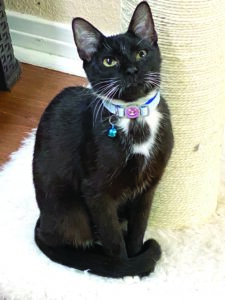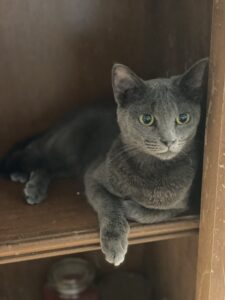By Dr. Beth Leermakers
Texas, like many states, has an animal overpopulation crisis. North Texas shelters are bursting at the seams with homeless cats and dogs. When city shelters run out of kennels, the staff must euthanize animals to make space for incoming strays. In 2021, Dallas Animal Services took in 4,437 cats and saved 3,515 of them (79 percent). In 2021, DAS took in 12,938 dogs, saving 11,557 of them (89 percent). There are just not enough adopters and rescue groups to save all the shelter animals.

Photos courtesy of
Melissa Kersey Lee
Cats can become pregnant when they are only five months old. They can have up to four litters per year, with an average of 4-6 kittens per litter. One cat could produce 168 kittens in seven years. To reduce pet overpopulation and the euthanization of healthy, adoptable animals, people must spay and neuter their cats and dogs. There are several important health and behavioral reasons to spay your cat.
Health Benefits
Altering your cat will increase his life an average of three to five years. Spaying/neutering your cat reduces the risk of several diseases, including:
Pyometra. Female cats that are not spayed are more likely to suffer from pyometra (infection of the uterus) later in life. Pyometra is a life-threatening condition that is expensive to treat.
Cancers. Spaying and neutering your cat helps prevent several types of cancer, including:
• Ovarian
• Mammary
• Testicular
Feline Immunodeficiency Virus (FIV) and Feline Leukemia Virus (FeLV). Unaltered male cats are more likely to fight, transmitting diseases to other cats through bites. FIV is very manageable and may never affect a cat’s health or lifespan. Unfortunately, FeLV is much deadlier — second only to trauma as the leading cause of death in cats, killing 85 percent of persistently infected felines within three years of diagnosis.
Behavioral Benefits
Spaying/neutering your cat reduces several problem behaviors:
Spraying urine. Unaltered male cats tend to spray urine in the house. Neutering them reduces this smelly, messy behavior.
Aggression. Unaltered male cats may be more aggressive toward people or other cats.
Yowling and marking. When they’re in heat, unaltered female cats mark the furniture and yowl noisily, trying to attract a mate. Female cats can go into heat four to five days every three weeks during breeding season (March through September). Your spayed cat won’t go into heat.
Wandering. Unaltered male and female cats try to get outside to find a mate. Wandering cats may be injured or killed due to fighting with other cats, being attacked by a predator (e.g., coyote), or getting hit by a car. Altering your cat removes his or her sexual urges, eliminating the desire to ‘roam’ in search of a mate.

When Should You Spay or Neuter Your Kitten?
Cats can be spayed or neutered as young as eight weeks old. Veterinarians recommend having the surgery done when your kitten is about four months old, to eliminate the chance of pregnancy and avoid urine spraying behavior. It is never too late to get your cat spayed or neutered. Your cat will still experience the health and behavioral benefits.
There is NO good reason to allow female cats to have a litter of kittens before being spayed. If you’d like your children to experience the miracle of birth and/or kittens, please become a foster family for a local shelter or rescue group. There are plenty of pregnant and nursing cats who need a safe place to raise their babies.
Low Cost Spay/
Neuter Clinics
Spay/neuter clinics provide low cost surgeries (and free surgeries for people in certain zip codes). Surgery is by appointment only.
Spay Neuter Network (spayneuternet.org) has a clinic in South Dallas.
Texas Coalition for Animal Protection (texasforthem.org) has mobile spay/neuter services and several DFW-area clinics.
Be Part of the Solution
Melissa Kersey Lee, president of We Treasure Felines cat rescue, works tirelessly to save homeless cats (and a few dogs) from DFW-area shelters and neighborhoods. Many of the feral and domestic cats she rescues have expensive veterinary needs (eye infections, broken bones) in addition to vaccinations, FIV/FeLV testing, and spay/neuter surgery. Lee often arrives at Texas Coalition for Animal Protection at 6 a.m. (the clinic opens at 8 a.m.) with several feral cats in traps, to secure a few of the 12 free feral cat spay/neuter spots.
Lee says: “Be part of the solution. We can all do something to help. Get your cat(s) and dog(s) spayed and neutered. There are resources all over the Metroplex for people to contribute in many ways. Help with Trap-Neuter-Return programs, foster a cat, donate supplies or money, and/or share adoptable kitties on social media to help them find loving furever homes.” Lee has several cats available for adoption, including Toro, a sweet black cat whom Lee spent 10- and one-half hours trapping at the TCC campus in Hurst. Unfortunately black cats, like black dogs, are the least likely to be adopted. Lee also has a gorgeous young Russian Blue female who hasn’t been named yet. To check out the adoptable cats, visit the We Treasure Felines cat rescue Facebook page. You can message Lee through that page or email her at [email protected].
